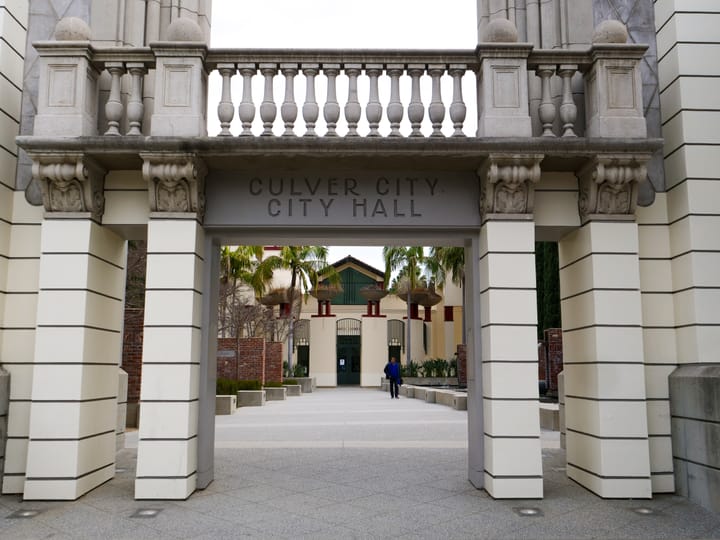Culver City commits $16 million to sustain Jubilo Village plans
The $16 million residual receipts loan to keep the 95-unit affordable housing project feasible will be included in the upcoming budget.

Instead of allocating the $16 million from the General Fund for a residual receipts loan needed to cover the shortfall in the Jubilo Village project as initially proposed at the March 10 City Council meeting, Culver City's City Council directed city staff to include these potential loan payments in the upcoming budget formulation discussions, with a potential commitment coming when the budget is formally approved.
Developer Community Corporation of Santa Monica (Community Corp.) has been working with Culver-Palms United Methodist Church since 2019 to make Jubilo Village — a 95-unit project that is 100% affordable housing on a large portion of Church's land at 4464 Sepulveda Boulevard — a reality.
According to city staff, entering a formal loan commitment with Community Corp. would have required a budget amendment that designates funding sources to appropriate that money.
However, city attorney Heather Baker suggested that instead of committing to the money that night, the council could direct city staff to prepare the budget with the loan included.
Once the budget with these assumptions included comes to the council for approval in June, it can commit to the appropriations. Motions that allocate funds in the budget like the amendment originally presented Monday night must pass with a four-fifths vote, but the direction to staff that was eventually given Monday night and the motion to give final approval to the budget in June only require a simple majority to pass.
Community Corp. Executive Director Tara Barauskas thanked the council for supporting the project and the community's advocacy in a statement to Culver Crescent.
"We're extremely grateful to the Culver City City Council for approving a $16 million loan commitment Monday night for Jubilo Village," Barauskas said. "We appreciate all the community advocates who showed up to support the project, and we look forward to bringing 95 much-needed affordable units of housing to Culver City."
The $16 million ask from Community Corp. represents the lost value from project-based vouchers that were perceived to have been promised in a letter from the city. These vouchers work similarly to Section 8 housing vouchers to subsidize the rent of individual units over a long period and are a vital funding resource for the project. Culver Crescent has not been able to independently verify the letter's contents.
Of that $16 million, only $4 million is needed by the confirmation of the construction when the construction loan closes, expected in July or August, with the remaining $12 million required when construction is complete by Fiscal Year 27-28.
Still, Community Corp. staff said it needed a commitment to attract investors who would purchase the tax credits to fund the project by their current expiration date of March 31. The developer has applied for a 90-day extension for the tax credits, which will likely be granted and would put their expiration date at June 30.
Delaying the payment to find ways to finance the project was ideal for several council members but was not presented initially as an option. The two members who did not vote to approve the final motion — council member Albert Vera and Mayor Dan O'Brien — expressed a desire to move forward with the project but feared committing $16 million that night. Vera abstained from voting on the final motion, while O'Brien voted no.
"We were elected to be mindful of the operational ability of the city," Vera said at the meeting.
The two believed the timing was poor due to the lack of readily available reserves in the city's General Fund. The unassigned money in the General Fund is currently only $2.3 million, which would not even be able to cover the $4 million that Community Corp. is asking for in the first loan installment.
According to projections presented by city staff with the item for consideration, the 30% General Fund reserve contingency required by City Council policy would be unmaintainable with this loan included without significant revenue increases or cuts to expenditures.
These contingencies can vary from city to city, with City Manager John Nachbar explaining that he typically sees a 20% to 25% contingency range in other cities.
"It is a little bit higher [in Culver City] because of the volatility in our revenue mix," Nachbar said.
But Community Corp. expressed at the meeting that if they did not receive the commitment that night, they would risk losing the tax credits from the California Tax Credit Allocation Committee (CTCAC), whose sales will provide another significant portion of the funding.
Losing these credits could make the project unfeasible and cause CTCAC to impose additional penalties on Community Corp., potentially barring them from applying for similar credits for two years.
The developer has made other attempts to obtain the needed funds, which they presented to the council at the March 10 meeting. Community Corp. provided probabilities and timelines for potential awards that gave them a high statistical chance of receiving at least $9.6 million in 2025 of a possible $62.7 million from sources of funding they have applied for.
Based on the amount of money awarded through these opportunities, the loan could be deemed unnecessary and removed from the budget in June. According to city staff, this would only require a simple motion.
Assistant City Manager Jesse Mays expressed the city's concerns about Community Corp.'s plan, arguing that the grants were "competitive" and that making any claims about the awards was difficult. Additionally, he said the city believes Community Corp. could do more to cut costs, such as renegotiating land fees.
Barauskas explained that renegotiating land costs was an abnormal practice in this field and pointed out the generosity of Culver-Palms United Methodist Church in holding onto the land for Community Corp. until they are ready. The Church will maintain ownership of the property even after land costs are paid. She also said the $13 million in land costs was below market rate.
"The land contract is cost-effective for Community Corp. because it means very low holding costs compared to other affordable housing projects," Community Corp. said in a statement to Culver Crescent. "Holding costs like land loans, insurance, and property taxes can be substantial."
The status of the loan was also a question mark for city staff. City consultant Keyser Marston and Associates advises clients to treat these loans as grants, arguing that repayment is inconsistent at best. According to city staff, the last affordable housing project in Culver City, Tilden Terrace, has not generated the revenue necessary to require payment of the loan.
"Staff's analysis is that the City will never see a payment," a city statement sent to Culver Crescent said of the potential loan to Community Corp.
While Community Corp. pays installments of residual receipts loans on projects annually, Culver City staff is concerned about the required revenue needed to repay the loan.
Loans that Community Corp. and other developers receive from governments for affordable housing projects are soft loans. These loans have little to no interest rates and are generally made subordinate to other, more traditional loans. Governments generally give these loans to developers or other bodies to contribute to the public's well-being.
According to Barauskas, a contingency will be set aside for emergencies and inflating costs, but money beyond those contingencies received from these grants and funding opportunities would go towards paying the loan back.
"You can anticipate that some money would be repaid from this project," Barauskas said. "Our current anticipated amount is $13.6 million."
While measures like the sale of the former Martin Retting Gun Store property and the passing of responsibility for the city's contract with Exodus Recovery to Los Angeles County for the Homekey Project in Culver City could provide some financial relief were considered, many of these options gave little respite to the budget to accommodate this loan.
The most effective solution to solve the budget deficit presented in staff's projections of the loan's impact was passing a quarter-cent sales tax measure to supplement the city's revenue. City Manager John Nachbar has suggested this numerous times as the ideal manner to alleviate pressure on the city's budget, as opposed to an evaluation of and possible reduction in city expenditures.
Implementing a quarter-cent sales tax in 2026 would turn the city's deficit into a surplus by Fiscal Year 27-28, even if the city still has responsibility for the Exodus Contract related to Project Homekey and maintains ownership of the Retting Gun Store.
This wasn't lost on council members who have advocated for affordable housing development in Culver City. Councilmember Bubba Fish said he believed the need for this kind of affordable housing project was more than apparent, noting that less than 500 multi-family units have been brought to Culver City since 2007.
He argued that the lack of supply has contributed to the exploding cost of housing and some of its consequences, such as decreasing diversity and a drop in Culver City Unified School District enrollment.
"Our population has flatlined at 40,000 people since the early 80s when the state's population has doubled in that time," Fish said. "To say we haven't pulled our weight is an understatement."
Even with some affordable housing projects in the development pipeline, Culver City Planning and Development Director Mark Muenzer says no 100% affordable projects are beyond the preliminary review stage.
Fish also pointed out the contrast in urgency between providing services to the homeless and creating affordable housing, likening the approach to "trying to bail out water and not plug the hole." Vice Mayor Freddy Puza also noted that he was displeased that the Local Emergency on Homelessness declared in January 2023 did not include conditions to create a pathway to affordable housing in Culver City.
"There is no doubt that morally, this is the right decision to make," Puza said about the project. "We know that permanent supportive housing is key to lifting people out of poverty and out of the cycle of homelessness."
However, the uncertainty surrounding the project's funds proved too much for O'Brien to approve. The previously mentioned sales-tax measure would require voter approval, and he argued that other projects in the future would not have the opportunity to be funded given the city's financial situation should this loan be approved.
Culver City's Mayor also placed blame for this situation on L.A. County, particularly regarding its distribution of funds from revenue received from Measure H. According to Chief Financial Officer Lisa Soghor, the city has received around $1.2 million in revenue from L.A. County's quarter-cent sales tax for homeless services while contributing around $40 million in tax receipts to the county.
O'Brien argued that the city should not be saddled with this uncertainty, which was created by the county's lack of support. He felt some assistance was more than deserved, pointing out the $3.5 billion that Measure H has brought in overall.
"The county chooses not to assist us in this perfect project," O'Brien argued. "We have data and comparative analysis of what we have done versus other cities of our size in California, and no city has come remotely close to what we have done in this regard."
Councilmember Yasmine-Imani McMorrin pointed out that the structural deficit didn't start last year. She argued that investing in people is "never wrong" and felt that the council and city staff could find the answers if they put in a proactive effort to do so.
"We fund what we want," McMorrin said, "and that is a really hard truth."
The motion to include an extra $16 million in the budget for this loan passed 3-1-1, with council member Vera abstaining and Mayor O'Brien dissenting.
EDITOR'S NOTE: The first and fifth grafs of this article have been reworded for clarity.




Comments ()